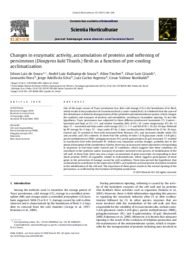Changes in enzymatic activity, accumulation of proteins and softening of persimmon (Diospyros kaki Thunb.) flesh as a function of pre-cooling acclimatization.
Changes in enzymatic activity, accumulation of proteins and softening of persimmon (Diospyros kaki Thunb.) flesh as a function of pre-cooling acclimatization.
Author(s): SOUZA, E. L. de; SOUZA, A. L. K. de; TIECHER, A.; GIRARDI, C. L.; NORA, L.; SILVA, J. A. da; ARGENTA, L. C.; ROMBALDI, C. V.
Summary: One of the major causes of ?Fuyu? persimmon loss after cold storage (CS) is the breakdown of its flesh, which results in the production of a translucent fruit (a water-soaked fruit). It is believed that the cause of this disturbance is linked to disorganization of the cytoskelet and endomembrane system, which changes the synthesis and transport of proteins and metabolites, resulting in incomplete ripening. To test this hypothesis, ?Fuyu? persimmon was subjected to three different postharvest treatments (T): Control ? harvested and kept at 23±3 ◦C and relative humidity (RH) of 85±5% (room temperature, RT) for 12 days, T1 ? harvested and kept under cold storage (CS) (1±1 ◦C and RH of 85±5%) for 30 days followed by RT storage for 2 days, T2 ? kept under RT for 2 days (acclimatization) followed by CS for 30 days. Control and T2 resulted in fruit with decreased flesh firmness (FF), and increased soluble solids (SS) and ascorbic acid (AA) contents. In these fruit the activity of endo-1,4-ß-glucanase (endo-1,4-ß-gluc), pectin methylesterase (PME), polygalacturonase (PG) and ß-galactosidase (ß-gal) increased. T1 resulted in translucent fruit with decreased FF, without any enzymatic activity changes, probably due to the physical disruption of the cytoskeleton. Further, there was an increased content of proteins corresponding to expansins in fruit kept under Control and T2 conditions, which suggests that these conditions do contribute to the synthesis and/or transport of proteins involved in the process of solubilization of the cell wall. In these fruit, there was also a major accumulation of gene transcripts corresponding to heat shock proteins (HSPs) of organelles related to endomembrane, which suggests participation of these genes in the prevention of damage caused by cold conditions. These data proved the hypotheses that acclimatization contributes to the expression of HSPs, and synthesis and transportat of proteins involved in the solubilization of the cell wall. The expression of these genes results in the normal ripening of the persimmon, as confirmed by the evolution of ethylene production.
Publication year: 2010
Types of publication: Journal article
Unit: Embrapa Grape & Wine
Keywords: Acúmulo de proteína, Caqui, Conservação, Enzima, Fruticultura, Pós-colheita, Resfriamento, Textura
Observation
Some of Embrapa's publications are published as ePub files. To read them, use or download one of the following free software options to your computer or mobile device. Android: Google Play Books; IOS: iBooks; Windows and Linux: Calibre.
Access other publications
Access the Agricultural Research Database (BDPA) to consult Embrapa's full library collection and records.
Visit Embrapa Bookstore to purchase books and other publications sold by Embrapa.

